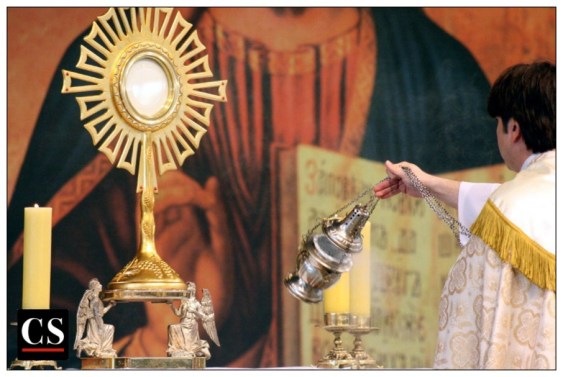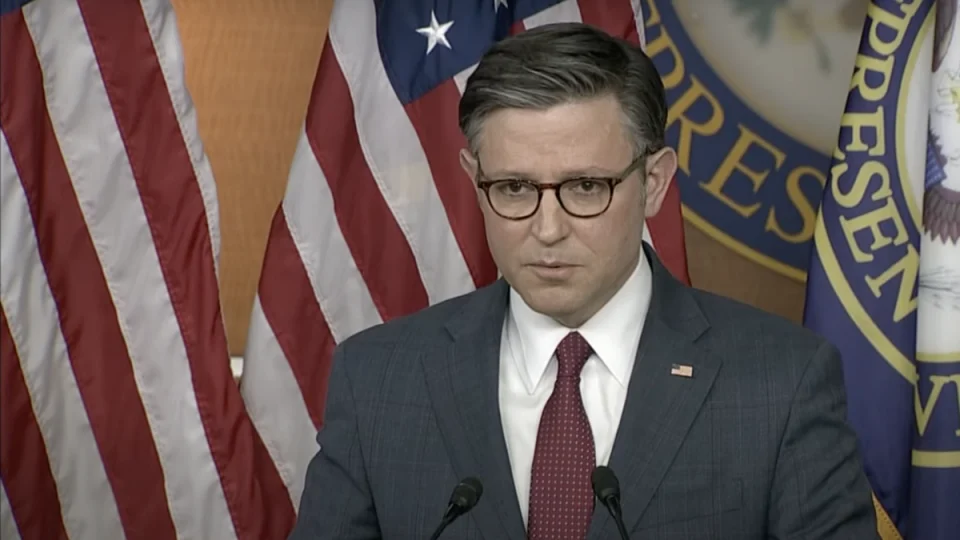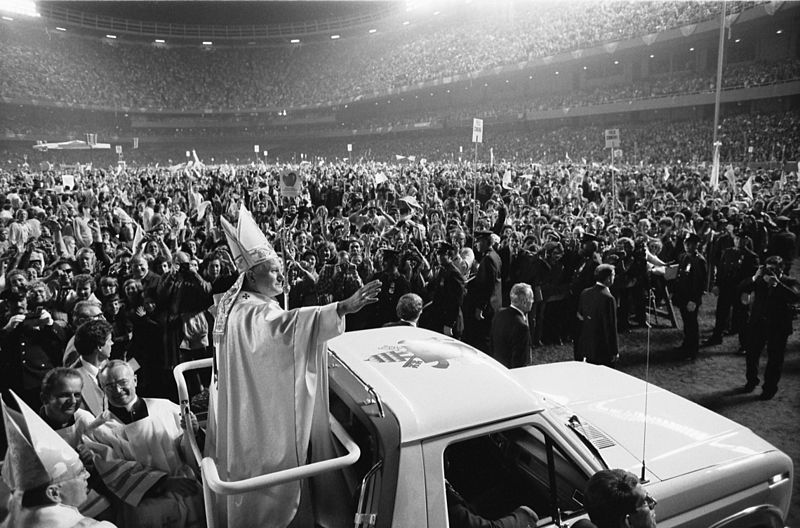On Conscience and Refraining from Communion, by Rob Marco

Is it Ethical to Give Emergency Contraception in Catholic Hospitals? by Chris Kahlenborn, MD
April 1, 2019
EXCLUSIVE: HHS Makes $5.1 Million Grant to Pro-Life Community Clinics, by Rachel del Guidice
April 1, 2019By Rob Marco, Catholic Stand, 31 March AD 2019
When we are faced with temptation, we often act as though we fall into it through weakness, and indeed many times that is the case. The apostles falling asleep in the Garden of Gethsemane due to the “weakness of the flesh” and letting the Lord down is one of the more obvious examples. Sometimes, however, we know what is right, and we refuse to do it. We are presented with a choice, and we act deliberately against the good.
For the past two Sundays I had an opportunity to make some money in what the Baltimore Catechism would define as “servile work.” It is hard for me to be inactive for any length of time: I’m a doer, and I always try to make the best of this disposition. In this case, I took advantage of the opportunity, and I further rationalized that the situation would not present itself to me on any other day. In my mind, if I didn’t respond to it, someone else would, and it would be gone. The fact that it was the Sabbath was ancillary to the consideration, and in this case, the love of money, which is the root of all evil, took precedence.
Keep Holy the Sabbath
As Catholics we are obliged to fulfill the Third Commandment and honor the Sabbath, but we do not honor it in the same fashion as Orthodox Jews: i.e., refraining from turning off light switches, driving, or doing manual labor, etc., which they believe violate God’s law. And yet, in this particular instance, my decision seemed to be a clear violation of the Third Commandment. I was not resting; the work involved physical labor. I was making money in the process, so contracting business. I knew the Commandment, and yet I did it anyway. Being honest with myself, it was the choice between keeping holy the Sabbath as the Lord commands, or of making a few hundred bucks for a few hours work. I took the pieces of silver and profaned the Lord’s Day.
We went to Mass that evening instead of in the morning because of circumstances, but when the moment for Communion arrived, I felt convicted that I should not receive before I confessed my sins. I try to avoid scrupulosity in matters of sin, but in this case I felt a firm conviction and did not consider it scrupulous. I almost always receive Communion, both at daily Mass and on Sundays, and I typically avail myself of the Sacrament of Penance once a month. In this instance, however, my conscience led me to refrain until I had gone to Confession.
The Role of Conscience
What does it mean to receive the Body and Blood of our Lord “worthily”? St. Paul admonishes believers to “examine themselves before they eat of the bread and drink from the cup” (1 Corinthians 11:28). The Church teaches that anyone conscious of a grave sin must receive the Sacrament of Reconciliation before coming to Communion (CCC #1385). When we examine ourselves, we must listen to our conscience quietly and carefully, judging ourselves not by what we “think” or “feel” is right or wrong, but what is right or wrong – that is, the moral law.
Conscience is a judgment of reason whereby the human person recognizes the moral quality of a concrete act that he is going to perform, is in the process of performing, or has already completed. In all he says and does, man is obliged to follow faithfully what he knows to be just and right. It is by the judgment of his conscience that man perceives and recognizes the prescriptions of the divine law. (CCC #1778)
It is often asserted too easily in pious conversation that this or that is a mortal sin. It is good to remember the fundamental conditions for mortal sin (i.e., sin that destroys the grace of God in the sinner). The sin must be a) grave matter; b) committed with full knowledge; and c) done with deliberate intent.
The first condition, grave matter, is more or less objective: killing someone is more serious than just yelling at him. But the second and third conditions rest with the individual and may only be known to them. We have a tendency to see other people’s sins as greater than our own and to downplay our own offenses. That is why it is important not only for us to refrain from judging others, but also to properly form our individual consciences with regard to the objective nature of sin. The Catechism states this clearly:
Prudent education teaches virtue; it prevents or cures fear, selfishness and pride, resentment arising from guilt, and feelings of complacency, born of human weakness and faults. The education of the conscience guarantees freedom and engenders peace of hear. (CCC #1784)
When our conscience convicts us, we should – in fact, we must – heed its call. In my particular situation, I felt the matter of working on a Sunday was grave. It is the Lord, after all, who gives the direct command to rest (whether we want to or not) and to refrain from work on the Sabbath. I knew it was wrong, and I could have said no, as it was not a necessity. Saying no would have cost me a few hundred dollars; nonetheless, I operated with deliberate intent and ignored the Lord’s prohibition. “To this purpose, man strives to interpret the data of experience and the signs of the times assisted by the virtue of prudence, by the advice of competent people, and by the help of the Holy Spirit and his gift” (CCC #1788).
Hunger for the Lord
I still remember the time when I was preparing to come into the Church; I had an overwhelming desire to receive the Lord in the Eucharist while not yet being able to. As the saying goes, “Hunger is the sweetest sauce.” Now that I have the opportunity to attend daily Mass, it is easy to get complacent and forget the radical gift that is the Body and Blood of the Lord in Communion. Refraining from receiving Communion because of an issue of conscience should be a reminder, however brief, of what it is like to be apart from Him:
Presenting oneself to receive Holy Communion should be a conscious decision, based on a reasoned judgment regarding one’s worthiness to do so, according to the Church’s objective criteria…The practice of indiscriminately presenting oneself to receive Holy Communion, merely as a consequence of being present at Mass, is an abuse that must be corrected. (Ratzinger Memo to Cardinal McCarrick, # 1)
It is easy to get self-conscious sitting in the pews while others shuffle by on their way up to Communion. “What will people think? Will they wonder what I’ve done?” That business belongs to the Lord, though, and does not matter much in the grand scheme of things. It is not our place to judge, and we should hope others will not judge us either. There is a certain humility in recognizing one’s own unworthiness for Communion as long as it is not overtaken by extreme scrupulosity or self-condemnation. With a firm resolve to reconcile oneself to God as soon as possible in the Sacrament of Penance, refraining from Communion when not in a state of grace can be an opportunity to taste the bitter herbs of separation from our Lord and move us to come back to Him with a repentant heart – and a firm resolve never to leave His side again.
ROB MARCO
Rob Marco is a happily married father of three living in southeastern Pennsylvania. After a few years in high school exploring Buddhism and Hare Krishna, he had a profound conversion experience of encountering Christ and converted to Catholicism in 1998, his freshman year of college. In 2002 he moved to the inner-city to help run a Catholic Worker house of hospitality for homeless men with drug and alcohol addictions and to minister to the poor. He spent ten years discerning a vocation to monastic life, and at one point sold everything he had and bought a school bus, which he renovated to live in as an urban hermit on the streets of Philadelphia. Rob is active in the work of the New Evangelization, starting a Catholic street evangelization apostolate in his area to share the Good News of Jesus Christ, and regularly visits men incarcerated in prison. He holds a B.A. in Geography from Penn State University, and a M.A. in Theology from Villanova University. He writes about faith, family, chastity, and Catholic manhood at “Wisdom and Folly” (www.robthefob.blogspot.com)
https://www.catholicstand.com/on-conscience-and-refraining-from-communion/
Related posts
Pope John Paul II at old Yankee Stadium, New York City, October 4, 1979... This work is from the U.S. News & World Report collection at the Library of Congress. According to the library, there are no known copyright restrictions on the use of this work. This photograph is a work for hire created between 1952 and 1986 by staff photographers at U.S. News & World Report:





